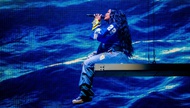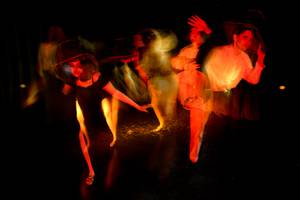Have you guys ever played Vegas? Man, I’ve never even been to Vegas in my entire life. I’m so excited to go there. We always got routed up through Reno on our way through the Southwest. We’re pretty excited. The only thing I’m bummed about is, I’m a huge Mariah Carey fan and I was going to stay an extra day and take in that show, but she doesn’t start [again] till next year. Oh well.
I noticed that most of your upcoming shows are arranged into one-week blocks with a couple weeks in between. Why is that? This has been a pretty crazy year for travel, with All Hands coming out at the top of the year, we did a big U.S. tour to start things off; we did a big Europe tour, and for the end of the year we just wanted to take a little break. It wears on you, especially with a group this big and so many different things going on in people’s personal and professional lives. We just wanted to condense it and do these little blocks—that way people with family back home aren’t putting so much of a burden on their kids and significant others. The idea is to not burn out. It’s still mayhem, but it’s concentrated blasts, and at least you’re in your own bed for a couple nights.
It’s becoming more and more tricky as we get into our 30s; it’s a lot to juggle.
Is that why the group recorded in a remote cabin this time? Yeah, man. With [2011’s] No Kings, I set our release date before we had even created a beat for the album, because we had a new distributor and we had to turn in a record before the end of the year. That was a mistake—I do not recommend anybody do that. We had two months to make the beats and a week to write the songs and a month to record and mix.
[Now] the only way to get people’s undivided attention, myself included, is to just break out and hole up. It ended up working really well—not only the songwriting but the bonding and the reconnection. When you can only use a landline and you’re not constantly getting blown up by everybody, it really is conducive to that centering and that refocusing. We definitely took more time with this one, and I think the end result benefits a lot from time. It’s a really dense record, but there are a lot of layers that are buried in there that warrant repeated listens that I’m really proud of.
With such a large collaboration—five MCs, two of whom write beats, plus two producers—how do you avoid a too-many-cooks situation in the studio? I don’t know if it’s possible, to be honest with you. I think that’s just something we’ve learned to live with. It’s a lot of people to please, and it goes beyond the songs themselves. I think the songs are easier to make than deciding on the artwork or the song titles or what promotional direction to take.
All of those decisions are being made in-house by the seven people that are on the record—those are the seven people that own the label as well. So, it’s a challenge, and it’s only gotten more challenging as we’ve grown and forged our own paths and decided what we like more and more as we get older. But luckily we’re somehow able to maneuver it for the most part. And with the crew albums comes a really unique sound, because that voting-style process ends up guiding us through. There are definitely some downsides from a managerial perspective, but ultimately I think it gives us a creative edge. You don’t just make a song and slap it on the record. If that song makes it, it has gone through a billion revisions. They really get molded into a specific shape.
It sounds like you really had to instill a greater-good mentality. How did you create that atmosphere? We’re always working on that, and it’s certainly not a huge, happy family all of the time. There have been growing pains, and there’s a lot people just willing this thing to work by any means. It’s certainly not the easiest route to take when it comes to pursuing a career in music.
It was awesome in the beginning, when none of us could get shows on our own, when we bonded together with that power-in-numbers theory. But I think we all believe that at the best moments, what we all do together outweighs what one of us does by ourself. Those really special times when we’re all onstage, there really isn’t a feeling as a solo artist that comes close to matching that collaborative spirit when everything is clicking. Obviously, you’ve got to go through a lot of things not clicking to find those moments, but I think it’s those moments that have kept us coming back and continuing to do whatever we can to make this thing work.
It’s shaky, certainly not this super-stable being, but everybody pitches in, and that’s gotten us to where we are. I would have never believed we’d still be a group going on 12 or 13 years. It didn’t seem sustainable, and we’ve somehow sustained it up to this point.
Doomtree makes very produced records, very layered and tight. How difficult is it to re-create that live? It’s tough, but I think it somehow works. Paper Tiger is the DJ and producer as well, and he’s taken some elements out, added some cuts in and things like that. I, a lot of the time, am doing some of the percussive stuff. Oftentimes live, I’m adding even more layers than are on the original stuff. Luckily, the rappers are so good at cutting through that—their voices and their energy command the room. I think the live shows are more focused on the MCs and all of us working together, and somehow it works.
I love our records, but I think our live shows are the reason people have stuck with us. It really is a unique experience, different than most other rap shows.
Doomtree with Astronautalis. October 18, 9 p.m., $22. The Sayers Club, 702-761-7618.







